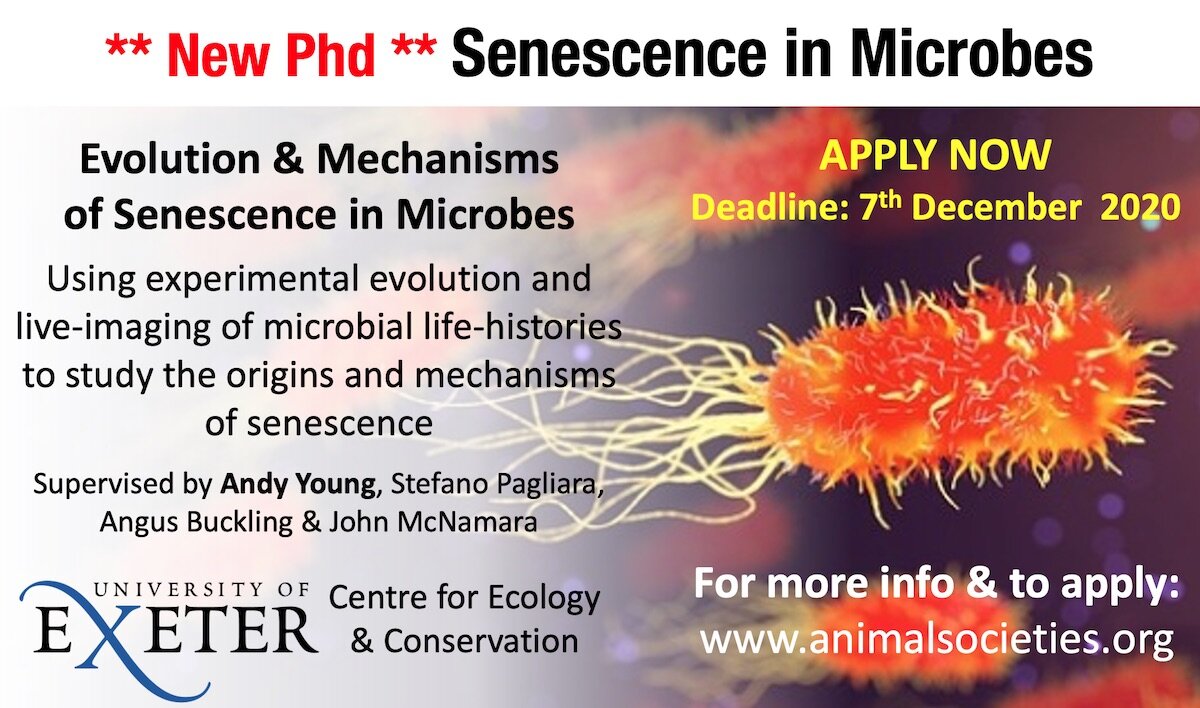** NEW PhD **
THE MECHANISMS & EVOLUTION OF SENESCENCE IN MICROBES
Lead Supervisor: Andrew Young (Animal Societies Group; University of Exeter Cornwall campus)
Co-supervisors: Stefano Pagliara & Angus Buckling (Exeter) & John McNamara (Bristol)
This project will test key hypotheses about the evolution and mechanisms of senescence in microbes, where ageing first evolved. We will combine experimental evolution with cutting-edge mechanistic work using live-imaging timelapse microscopy to study the life-histories of dividing cell lineages.
By combining timelapse microscopy with the microfluidic ‘mother machine’, we can phenotype the life-history traits of cells in dividing E. coli lineages, as pictured here.
Senescence, the accumulation of biomolecular damage leading to age‐related declines in reproduction and survival, is pervasive across the animal kingdom and has become a key focus of research in evolutionary biology and biomedicine. It has long been thought that unicellular organisms typically do not senesce, because without a clear germ‐soma divide any damage accumulated by one generation would be passed to the next, leading to the progressive deterioration and ultimate extinction of the lineage. However, the advent of high resolution live‐imaging techniques that allow researchers to track the life‐histories of individual cells and lineages within clonal E. coli populations has revealed evidence of clearly structured variation in both reproduction and survival among cells, which is now widely interpreted as evidence that bacteria do senesce (Stewart et al. 2005 PLOS Biology). This discovery has triggered a surge of interest in the possibility of bacterial senescence (Moger‐Reischer & Lennon 2019 Nature Reviews Microbiology), both among evolutionary biologists and applied microbiologists. This project will combine cutting‐edge microbiology with experimental evolution to critically assess whether this complex phenotype in E. coli does indeed show the key mechanistic and evolutionary hallmarks of senescence.
The project will have two main strands. First, as recent work has questioned whether the observed variation in performance actually does arise via damage accumulation (Lapinska et al. 2019 Philosophical Transactions of the Royal Society B), we will couple high resolution live‐imaging of dividing cell lineages with novel fluorescent markers that allow us to observe damage occurring in real time, to experimentally test whether the variation arises via damage accumulation or novel alternative mechanisms unrelated to senescence. Second, we will develop evolutionary models of microbial senescence, to investigate whether the true pattern of variation in cellular performance is consistent with what one would expect of senescence. We will then test the key predictions of these models by conducting experimental evolution using E. coli populations. This ambitious project is expected to significantly advance our understanding of senescence in microbes, shed new light on the evolutionary origin of senescence, and yield novel insights relevant to the global effort to combat antimicrobial resistance.
The successful candidate will be based in Andy Young’s research group at the University of Exeter’s world-renowned Centre for Ecology and Conservation (CEC) in Penryn, Cornwall. The supervisory team also includes the complementary expertise of Stefano Pagliara (mechanistic microbiology & timelapse microscopy; Exeter Streatham Campus), Angus Buckling (experimental evolution in microbes; Exeter CEC, Penryn campus) and John McNamara (evolutionary theory; Bristol). The candidate will gain cutting‐edge research skills in senescence biology, microbiology, evolutionary modelling and experimental evolution under the mentorship of a supervisory team. The project would therefore suit a candidate seeking an ambitious project probing the evolutionary and mechanistic underpinnings of senescence using an extraordinary model system.
Read our latest paper on Bacterial Senescence to find out more…
Łapińska U, Glover G, Capilla-Lasheras P, *Young AJ, *Pagliara S. (2019)
Bacterial ageing in the absence of external stressors
Philosophical Transactions of the Royal Society
FIND OUT MORE ABOUT… Our SENESCENCE RESEARCH | OUR SOCIAL EVOLUTION RESEARCH | OUR GROUP
